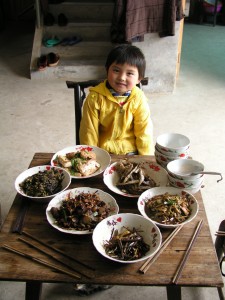Grandmother’s cooking æ…ˆæ¯èœ
 I’m sure many readers of this blog will be familiar with Michael Pollan and his work – especially the eminently sensible, and absolutely timely polemic In Defence of Food. For those of you who aren’t, his basic thesis is that the growth of nutritional science has made most of use confused about what to eat, and that the answer to all our worries is simply to ‘Eat food. Not too much. Mostly plants’. By ‘food’, he means real food made from recognisable ingredients, not the weird, high-tech ‘foodlike substances’ on sale in your local supermarket. He also suggests that our grandmothers knew much more about how to eat well than we did, because their brains were not addled by contradictory and often misleading nutritional advice, and because they took a similarly commonsense approach to feeding their families. I was reminded of all this by his latest piece in the New York Times.
I’m sure many readers of this blog will be familiar with Michael Pollan and his work – especially the eminently sensible, and absolutely timely polemic In Defence of Food. For those of you who aren’t, his basic thesis is that the growth of nutritional science has made most of use confused about what to eat, and that the answer to all our worries is simply to ‘Eat food. Not too much. Mostly plants’. By ‘food’, he means real food made from recognisable ingredients, not the weird, high-tech ‘foodlike substances’ on sale in your local supermarket. He also suggests that our grandmothers knew much more about how to eat well than we did, because their brains were not addled by contradictory and often misleading nutritional advice, and because they took a similarly commonsense approach to feeding their families. I was reminded of all this by his latest piece in the New York Times.
His arguments struck a real chord with my own experiences in China. One of my overwhelming impressions of China was how WELL people ate – they knew how to nourish their minds and bodies, how to vary their diets according to the seasons and the climate, how to hasten recovery from illness. And yet, ironically, many of the Chinese people I met, especially the culinary professionals, would go on all the time about ‘Western nutrition’ and how ‘scientific’ it was. They clearly felt that there was something a bit backward and old-fashioned about their own wealth of nutritional knowledge, and that thinking of food in terms of nutrients in the Western style would be a great leap forward for Chinese cuisine.
It seems to me absolutely tragic, that the Chinese, who of all the world’s people surely know how to eat, have so little pride in their own culinary culture. As far as I can see, the traditional Chinese approach to diet and health could be a model for the entire human race – and if my own compatriots, who live increasingly on processed food, could learn from the Chinese example, they would be a lot healthier. Unfortunately, however, exactly the opposite is happening, and the Chinese are following the ‘advanced’ example of Western dietary advice, and talking more and more about ‘losing weight’ and ‘nutrition’, while getting fatter, less healthy, and more prone to problems like diabetes and heart disease.
Has Michael Pollan’s In Defence of Food been translated into Chinese? I do hope so, and I hope everyone reads it!

2 Responses to “Grandmother’s cooking æ…ˆæ¯èœ”
Same here in Japan. I find it mind boggling that in the country that has the greatest number of people over 100 is snatching up all of the “wonderful” miracle diet products produced by my country (the USA) which has some of (if not the) highest percentage of diabetes and obesity! Honestly, every few years the advice seems to change so greatly that sometimes the opposite of what we once believed becomes the common knowledge! Ever wonder if eggs were ok to eat or likely to cause your untimely demise? I’ve finally decided to add them to a balanced diet!
Also in Italy, incredible what rubbish people buy. I emptied the fridge for some friends who went away. I ended up giving everything to the dogs. Even the cheese was awfull and don’t get me talking about breakfast cereals and the bread and crackers. Besides the fact that they probably are not healthy they all taste digusting.
They ate aspergus from the freezer, carrots presliced, ……….